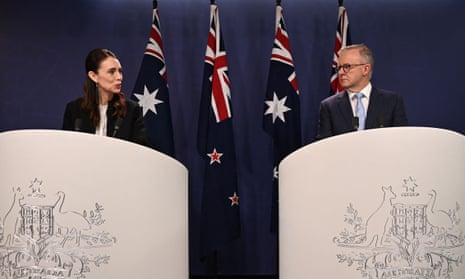New Zealanders in Australia may soon benefit from voting rights, a faster pathway to citizenship and increased protections against deportation, the countries’ prime ministers have revealed.
At a press conference in Sydney, the Australian prime minister, Anthony Albanese, committed to take a more “commonsense” approach when applying the power to cancel New Zealand citizens’ visas, signalling his government will limit its use on longterm residents of Australia.
While the comments signal a shift in implementation rather than a full revamp or repeal, it is a foreign policy win for Ardern, who has been pushing for years to end the deportations of those with tenuous links to New Zealand.
“[Section] 501 [visa cancellations] will continue to exist,” Albanese said. “We will continue to deport people when appropriate.
“But we will have some commonsense applied here – and where you have a circumstance where someone has lived their entire life, effectively, in Australia with no connection whatsoever to New Zealand, then commonsense should apply.”
Ardern said that was “exactly what we have asked of Australia”.
“We acknowledge that Australia will continue to deport – as New Zealand currently does … deport those who don’t have long term connection to New Zealand,” she said. “What we’ve been seeking is common sense and the spirit of friendship.”
The issue was addressed at a joint appearance from the two leaders, which Ardern said was about “further cementing the close renewed relationship” between the two countries. The meeting continued a warming of tone from the sometimes strained relationship seen under Scott Morrison.
Albanese announced that he would consider giving voting rights to New Zealanders based in Australia, and look at pathways for more New Zealand residents to become citizens.
He said the Australian government didn’t “want people to be temporary residents forever”, promising to announce improved pathways to citizenship by Anzac Day 2023. Once a person attains dual Australian citizenship they cannot be deported.
Albanese said he would look at aligning the policy on voting in Australia with New Zealand’s rules – Australians residing in New Zealand for more than a year can vote in local elections.
“We’ll be asking the joint standing committee on electoral matters to consider whether there’s a way to return to systems that have existed in the past of giving New Zealand people who are here in Australia, contributing to society, paying taxes, working, voting rights here in Australia as well,” Albanese said.
The moves were announced after formal talks on Friday morning in Sydney – the second set of bilateral discussions between the two leaders since Albanese was elected.
Ardern said on Friday they had agreed that “no New Zealand or Australian should be rendered permanently temporary. That is a step-change in the way that we’ve previously seen New Zealanders treated here.” In another sign of closer relations, the two leaders agreed to annual bilateral talks between their ministers of foreign affairs, defence, finance and climate change.
On Wednesday, Ardern said New Zealand was seeing a “reset” of the relationship with Australia that she had hoped for, and the Albanese administration “fundamentally represents a government that takes a different view to Kiwis in Australia and the contribution they make”.
A shift on 501s will be particularly celebrated in New Zealand, where there have been growing concerns about reoffending and gang activity by deportees. The 501 provision allows Australia to cancel visas for longterm residents on character grounds, including for years-old criminal convictions or associating with gang members. Since the policy began in 2015 more than 2,570 people have been deported from Australia to New Zealand, and according to police data released to the New Zealand Herald, about half have reoffended. New Zealand deported 32 Australians over the same period.
The large-scale deportation of New Zealand citizens under the policy – some of whom have lived in Australia their entire lives and had few or no links to New Zealand – has been a longstanding sore point in the relationship between the two countries. In 2020, Ardern lashed then prime minister Scott Morrison for “testing” the friendship between the two nations, and accused Australia of deporting “your people and your problems” using “unfair” policies.
“You have deported more than 2,000 individuals, and among them will be genuine Kiwis who do need to learn the consequences of their actions,” she said at the time.
“But among those 2,000 are individuals who are too young to become criminals on our watch … We will own our people. We ask that Australia stops exporting theirs.”
